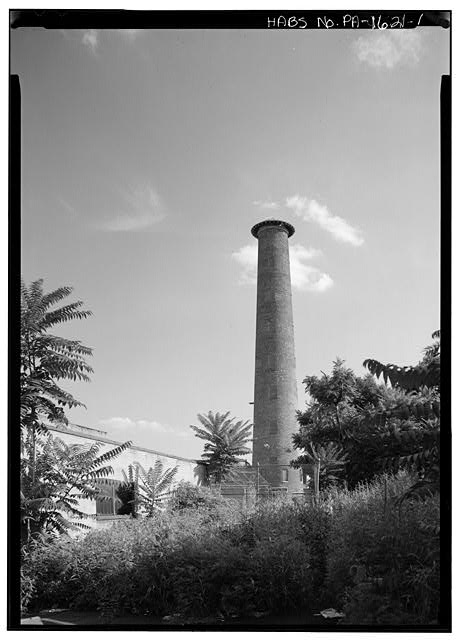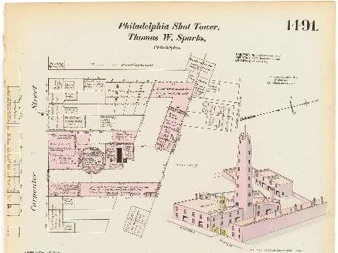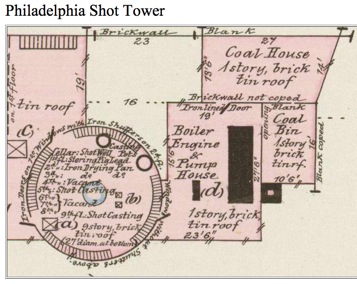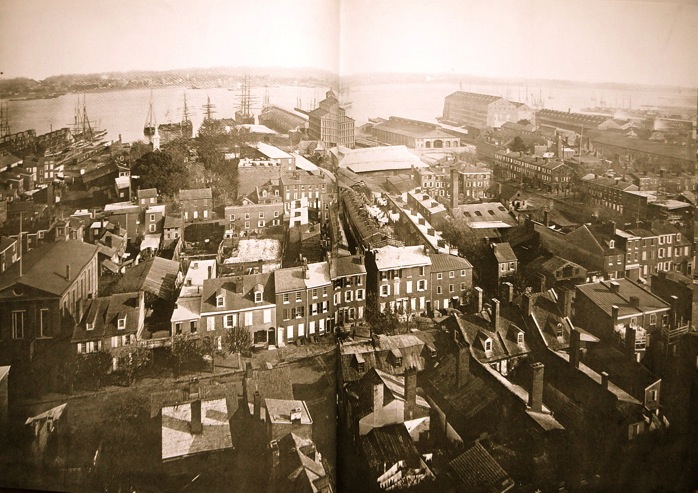
"General view looking west." Jack E. Boucher (1973). Historic American Engineering Record - Sparks Shot Tower
Sparks Shot Tower, 1808
129-131 Carpenter Street, Philadelphia PA 19147
© John Mayer, Workshop of the World (Oliver Evans
Press, 1990).
The Sparks Shot Tower is the oldest
standing industrial feature in South Philadelphia and is
purported to be the oldest shot tower in America. The
tower was built to fill a need for lead shot created by
the 1807 Embargo Act, which cut off the supply of foreign
goods. 1
In 1808, John Bishop, Thomas Sparks and James Clement
expanded their plumbing partnership and built the shot
tower to begin manufacturing lead shot for sporting
purposes. During the war of 1812, at the request of the
federal government, they began to supply munitions for
the military. With this shift in production, John Bishop,
a member of the Society of Friends, sold his interest in
the business to Thomas Sparks. 2
The tower remained in the Sparks family until 1904, when
the United Lead Company of Pennsylvania bought it. It
continued in production until 1913, when it passed to the
city of Philadelphia. It is now managed by the
Philadelphia Recreation Department.
The tower is entirely of brick construction and
originally stood 150 feet high. It is 30 feet in diameter
at the base and tapers to 15 feet at the top. Support
buildings included a main building for finishing the
shot, storehouses, a barrel shop, and office buildings.
The tower, with its twentieth-century roof, is the only
nineteenth-century survivor on the site.
3
The process of manufacturing shot changed little during
the 100 or more years of the tower's operations. Molten
lead was poured through screens at the top of the tower;
the coarseness of the screen determined the size of the
shot. As the pellets of hot lead fell, they cooled and
hardened into pellets and finally cooled in vats of water
at the base of the tower. The shot then was screened,
polished, sorted, and packed in the main
building.
1 George Morgan, The
History of the City of Philadelphia, the City of
Firsts, (Philadelphia,
1926).
2
Philadelphia Historical Commission,
Sparks Shot Tower folder, miscellaneous notes. See
also Stephen N. Winslow, Biographies of Successful
Philadelphia Merchants, (Philadelphia, 1864) pp. 141-143.
3
Hexamer General Survey, #1491 (1880)
"Philadelphia Shot Tower, Thomas W.
Sparks."


Details from Hexamer General Survey, #1491 (1880)
"Philadelphia Shot Tower, Thomas W.
Sparks."
Descriptions therein include:
Founded July 4th, 1808.
Tower height 150 feet.
Tower walls 30" - 27" - 21" - 18" - 18" - 13" - 13"
Machinery: 17 cylinders for sizing shot. 2 rumblers for
cleaning shot. 4 polishers (3 iron and 1 wooden) for
polishing shot. 3 sets of screening tables (french plate
glass). 1 steam engine [10-12 horse power]. 1 steam
boiler. 1 steam pump.
Update May
2007 (by Joel
Spivak):
No change.
See also:
"THOMAS
SPARKS, late President, was born in the old district of
Southwark, Philadelphia county, Pennsylvania, April 19th,
1817, and was educated at Nazareth Hall, the celebrated
Moravian Boarding School. In 1838, his uncle, Thomas,
took him into his business of manufacturing shot, the
latter having for thirty years previous been engaged in
this vocation, and being then sole proprietor of Sparks'
Shot Tower, a prominent landmark near the Delaware in the
southern part of the city. He continued with his relative
until his [uncle's] death, and in 1855 succeeded to the
business. The establishment has been in active operation
for nearly two-thirds of a century, and has manufactured
vast quantities of war material, especially during the
War of the Rebellion, when large orders for conical
bullets were received and filled. Mr. Sparks died October
8th, 1874." —Charles Robson, Manufactories &
Manufacturers of Pennsylvania (Galaxy, 1875), p. 155.
-----

Note "the tall ship houses and dry
dock of the Navy Yard, and the waterfront warehouses
and docks" shown in one of "Four Panoramas of
Philadelphia, 1870", taken from atop the Spark's
Shot Tower, reprinted from the Collection of the
Free Library of Philadelphia in the book by Robert
F. Looney, "Old Philadelphia in Early Photographs,
1839-1914" (Dover, 1976), pp. 6-13.
-----